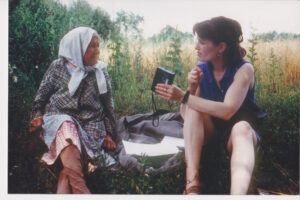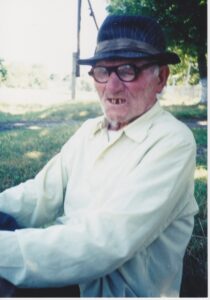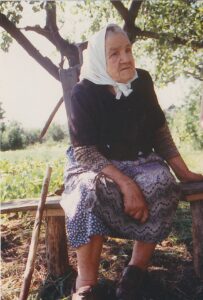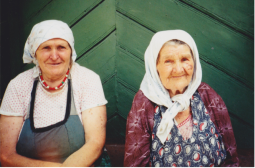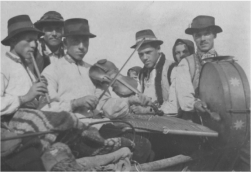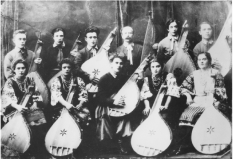—Did you go to the market fair?
Yevdokia Petrivna: Back then, Sunday was considered a holiday, and people would go to the market fair where they were selling sheep and cows.
—Were there any startsi at the fair?
Yevdokia Petrivna: Yes, the blind ones and the paupers.
—Did they play at the fair?
Yevdokia Petrivna: No. After the war, they would sing in the train cars. These blind people would play the bandura or the harmonia, and they were accompanied by a boy or a girl. People gave them money.
—How did he play the bandura?
Yevdokia Petrivna: The strings were up here and at the top. When he sang, all the people in the train car cried.
—What did he sing?
Yevdokia Petrivna: It was a long time ago. I no longer remember.
—Where was this?
Yevdokia Petrivna: This was on our way home from Kharkiv. We would get off at Zolochiv and walk eight kilometers.
—What did people give him?
Yevdokia Petrivna: People in the train car would give the singer money and the child got buns, gingerbread, or candy—whatever people had.
Yevdokia Petrivna Bondarenko (Kharkiv region)
—Were there any kurkuli in your village?
Yevdokia Petrivna: Yes. They were evicted from their houses and deported. One such man’s family was exiled to Solovky; his daughter got married in Sosnovka and stayed. His son got married here and stayed, too. Then when the war began, they started evicting and deporting them, chasing them out of their house. This was done about five times. He’d return to his house and get evicted again.
—Was this done to the father or the son?
Yevdokia Petrivna: The father was exiled to Solovky with the whole family. They were a large family. They picked the mushrooms there, ate them, and died—all of them. There were also a brother and a sister from that family. The brother stayed here and lives in Pidhorodnia now.
—Are they still alive?
Yevdokia Petrivna: The brother got ill and went blind. One woman came from that village and said, “He went blind and cannot walk. He gets by with a cane. He also lost his ability to speak.” He was paralyzed.
…………………………………………..…..……………..…
—What was the name of the exiled kurkul?
Yevdokia Petrivna: Semen Khrystenko.
—What did he have?
Yevdokia Petrivna: An oil press, a cow, and a horse. Back at the time, kurkuli were all like people are now: they owned an oil press, a cow, and a horse, and that was enough to qualify as a kurkul. Now people have two cows, pigs, hens, and houses, and they are not called a kurkul.
Yevdokia Petrivna Bondarenko (Kharkiv region)
—Was there an icon painter in the village?
Yevdokia Petrivna: No.
—Where did people buy the icons?
Yevdokia Petrivna: My mother and grandmother bought these icons; these are old icons.
—Were they painted on wood?
Yevdokia Petrivna: Yes, covered with glass.
—Are your icons covered with glass, too?
Yevdokia Petrivna: Yes, both Christ the Savior and the Mother of God. I also have the Rosary there. I still have two of those.
